Inside This Article
Voice teaching can be tough, but when you make the paradigm shift from a mechanical approach to a learning, somatic approach, everything changes!
THE COMPLEXITIES OF BEING A VOICE TEACHER
To be a voice teacher is a special kind of calling. Most of us are performers ourselves, and we have the privilege, in addition to working on our own singing and performance career (or voice and acting career), of being with others as they learn about their instrument, hone their craft, and improve their performance abilities with us as mentors and guides.
It almost sounds simple, right? But, if we consider the complexities of each of these areas of improvement in the context of learning, the human nervous system, art, music, culture and business, it can get quite tricky!
Instrument
What is the vocal instrument? The mouth and throat? The torso? The entire body? What about the brain? The self?!? What isn’t the vocal instrument?
AAAAHHH!
Craft
Which craft? There are so many ways to sing, so many traditions… so many schools of thought. Then there’s THE PERSON! The student’s individuality and style, interests and preferences. How do we work with them as an individual and not just as any other singer?!? How can one learn craft – which is mostly received knowledge from the past – in such a way that it remains fresh, current and alive now? Relevant and spontaneous?
AAAAHHH!
Performance abilities
Which abilities? What kinds of performances? How could we possibly help everyone with everything they’ll need to know and grow into in order to become an accomplished actor/singer, singer/songwriter, opera singer, pop singer… THERE’S SO MUCH!! And performance, even when one is very well-prepared, is so unpredictable. (Someone forgets their line. The song is played in the wrong key. You can’t hear yourself. You can’t see the conductor at a crucial moment, etc.) How can one prepare for ANYTHING?
AAAAHHH!!
But, somehow, that’s our job.
And let’s not even get into… acoustics, diction, style, time periods, historical perspectives, current trends, voice science, vocal health, learning theories… and that lessons should feel fun, singing should feel joyful and creativity should be free!
MORE AAAAHHH!!
Here are articles I’ve written on voice training and teaching that could shed some light on some of these areas of complexity in ways that can bring some new clarity, understanding and perspective to these age-old issues both practically and theoretically:
[VOICE] TEACHERS… WHAT IS VOICE TRAINING?
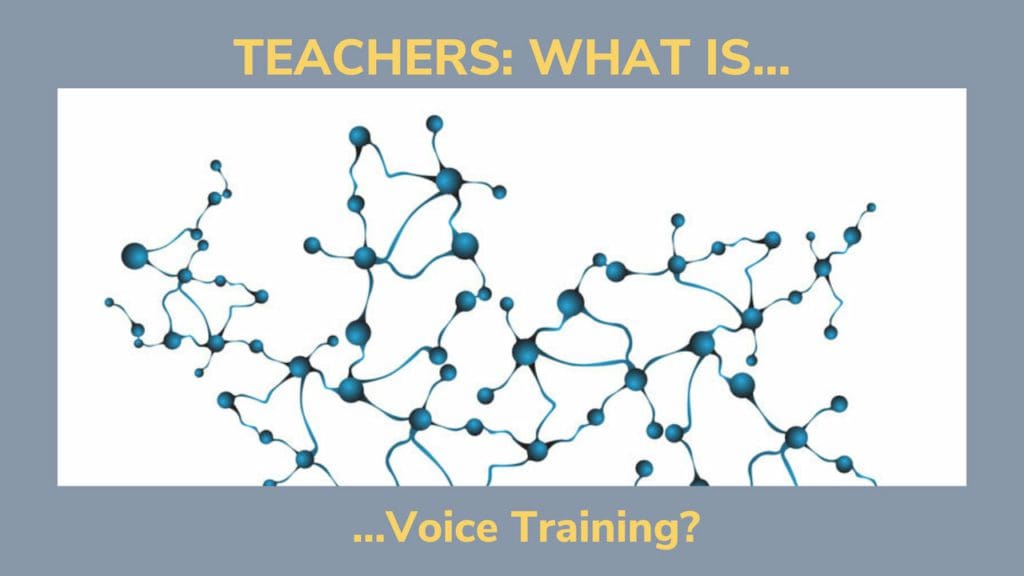
In this article, I set out to explore 7 big concepts/principles about learning and facilitation that if integrated into voice training would transform the entire process for both the teacher and the student. I explain each one in detail in the article, but just seeing them listed here might be enough to start you pondering and set you on the paradigm shift that can bring about…
- Know that, as the facilitator, you both know and don’t know at all times.
- Trust the system, guide the person.
- Everything/Anything can be a learning experience (or not)
- Shifts in experience when noticed, celebrated and accepted can reset the entire system and the action being explored (e.g. singing) in lasting ways.
- Understand networked, non-linear learning – complexity theory in action.
- Understand “long-view learning” – complexity concretized.
- Understand integration and let the person/system do the rest.
In the end, the question is: as facilitators are we leading or following? We can do both, of course, but sometimes the most powerful thing to do is to follow the person we are working with as we stay connected with ourselves and all of our experience and know-how while letting the process unfold in a beautiful, emergent dance of co-leading and co-following.
In the end, the question is: as facilitators are we leading or following?
Read the full article: Voice Teachers: What is Voice Training?
VOICE TEACHERS – WHAT IS GOOD TEACHING?
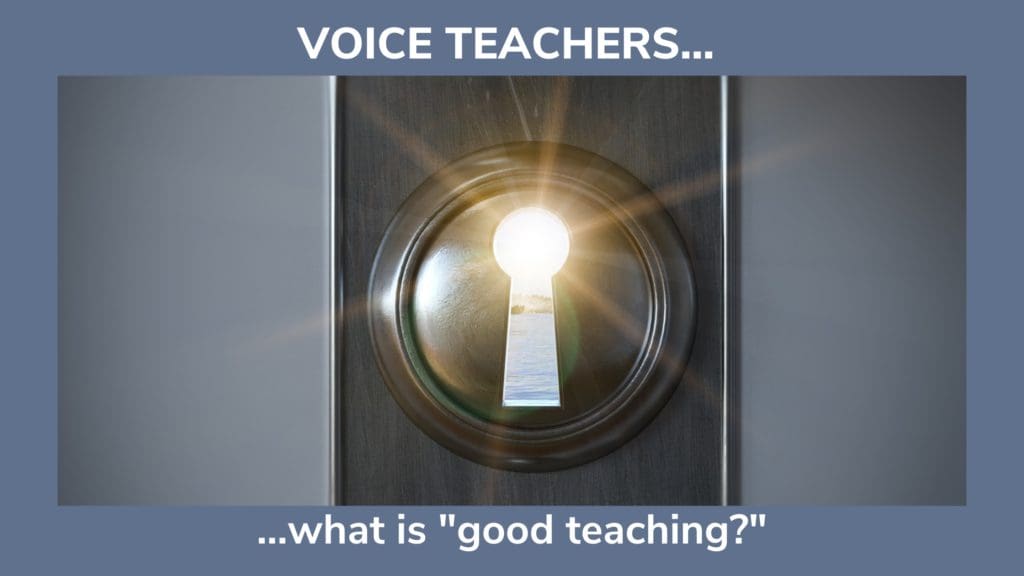
This blog is a deep dive into learning, facilitation and working with the whole person looking at, primarily the idea of ORGANIC LEARNING as the starting place of understanding how to facilitate genuine and integrated learning processes for our students.
So, what is ORGANIC LEARNING?
In short – I go into much more detail in the article – Organic Learning is the kind of learning we do as children. We are interested in something – figuring something out, creating something, making something, trying something, playing with something – and we start and engage with it for a while then maybe do something else and then come back to it later. We make little improvements over time in the midst of lots of other experiences and projects. And then, once we feel satisfied, we move on and take forward with us anything we learned in the process of engaging in that interest or project. Maybe it comes up again – like an artist who has developed a style with recurring themes. Or a chef who likes a certain ingredient or technique.
In organic learning, what we do is not always the same as what we learn.
This is true in somatic vocal learning too!
We may play with something for a while and find cool things – new sounds, new colors, new ways to do old things, new abilities we didn’t know we had, etc.. Our voice improves. And, we learn something about ourselves and our voice that we can carry forward into other projects or actions. Perhaps they become the building blocks of future learning and ability! (They probably do!)
This is organic learning.
And we can facilitate this kind of learning process for our voice students around voice, sounding, singing, performance, health, expression, creativity and more.
Read the full article: Teachers: What is good teaching?
7 WAYS VOICE TEACHERS CAN SERVE THEIR STUDENTS BETTER
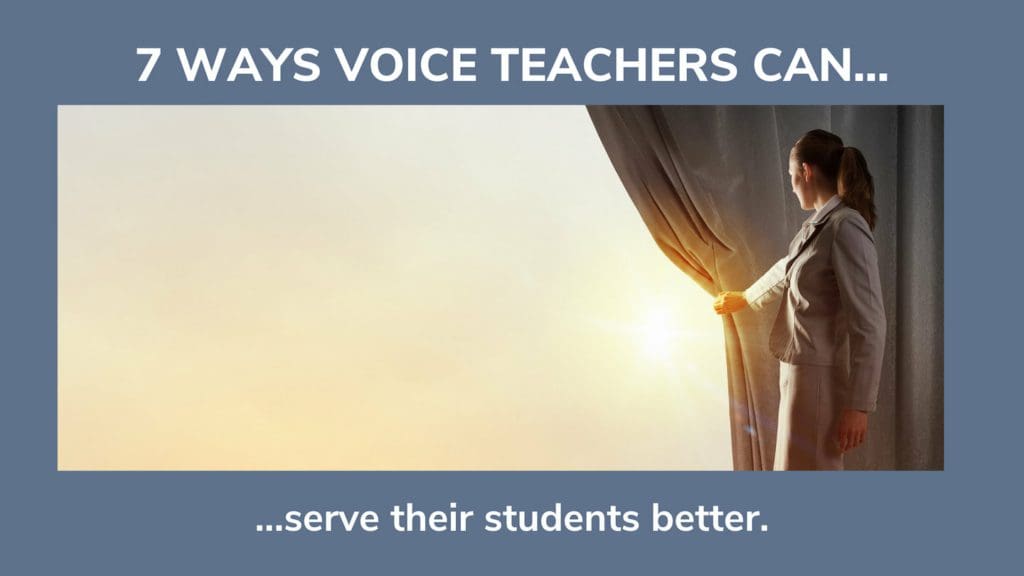
In this article, I set out to guide a voice teacher to begin to transform their teaching from the usual didactic way (do this, do that; fix this fix that; practice this, practice that…) into the facilitation of a somatic process of their own for the student to engage in with us, but not “for us” (in a performative way) or superimposed on the “by us” in a maestro/pupil kind of way.
Here are the 7 suggestions to help transform your teaching:
(BEGINNERS)
1 Slow Down
…exactly what it sounds like. When we slow down there’s more space for sensing and
discovery. A whole world of possibilities can open up where there previously seemed to
be no other options…
2 Beware of the Potpourri-Style Lesson
…a little this, a little that, a little this, but nothing ever adds up.
3 Avoid only using Quick Fixes (even if they work)
…just because there’s a positive effect doesn’t mean your student has learned anything.
Anything can have an effect, but have we learned anything?!? Sneezing will have an effect. So will sitting down. So will a stressful text or looking out the window… What’s the difference between that and a “fixit” prompt? “Fixing” is superimposing, it might work briefly, but isn’t truly integrated so it would require much willpower to keep it going. It doesn’t need to be that way!
4 Remember that Not Everyone is the Same
…we’re all a little different (sometimes very different) and that needs to be taken into
account when working with anyone. There’s no one-size-fits-all solution to anything.
(NON-BEGINNERS)
5 Work with Awareness and the Rest will Follow
…sometimes we have our students DO too much and don’t invite them to sense and
become aware of themselves and what they are doing enough. Sometimes just sensing and becoming more aware of what we are doing is ENOUGH to change an action.
6 Facilitate Learning more than Anything Else
…sure we want people’s voices to improve – so do they – but if we are not facilitating
learning and helping them learn how to learn in the process of our working with them
they can become dependent on us and never really connect with themselves and their own process of development. Facilitate THEIR self-development in the process of vocal improvement and it’s a win win!
7 Engage the Whole Person
…human beings are so much more than their voices, their singing, their performances.
We are people with thoughts, feelings, sensations, desires, lives, stories, needs, dreams… it’s all there ALL the time! And, although we don’t need to engage all of that directly in a voice lesson, knowing, holding and respecting that it’s there at all times changes the dynamic of the learning in an expansive and integrated way.
Each is explained in more detail in the article, I think you get the gist.
As you can see just reading a little bit about each suggestion, a whole new world of exploration can open up when we slow down, allowing space for the student to explore, rest and discover while being respected as the intelligent, whole and beautiful person they are.
Read the full article: 7 Ways Teachers can Serve their Students Better
So…what is vocal training? What is good voice teaching? How can we learn to facilitate instead of “teach”?
These are all great questions that I wish all voice teachers would ponder more deeply and think about from a broader perspective – not just from within the voice field as it has been handed down to us from the last few hundred years of voice training.
I have found that learning in and bringing back ideas from other fields such as: Somatics, Experiential Learning, Psychology, Physics (Chaos Theory, Complexity Theory), Systems Theory, Play Theory, Developmental Learning, Embryology, Art, Improv… and more brings an amazing new perspective to vocal learning and facilitation and can add so much to our pedagogy.
Voice Teaching is not so much about what we know, it is what we do with the knowledge we have (and don’t have) WITH the individual student we’re with for the purpose of their vocal growth, learning and development – which is for them to engage in, find what they want and need in, and decide what to take with them out of the studio and into their life.
It’s as simple and as complex as that!
Read these articles next to expand your knowledge about how you can be a better voice teacher for your students:
[VOICE] TEACHERS… WHAT IS VOICE TRAINING?
Key concepts/principles that can transform the voice training process for both teachers and students.
VOICE TEACHERS – WHAT IS GOOD TEACHING?
Delve into the concept of Organic Learning and how it can be applied in voice teaching to facilitate genuine and integrated learning processes for students.
7 WAYS VOICE TEACHERS CAN SERVE THEIR STUDENTS BETTER
Suggestions to transform teaching from a didactic approach to facilitating a somatic learning process for students, emphasizing awareness, facilitating learning, and engaging the whole person.
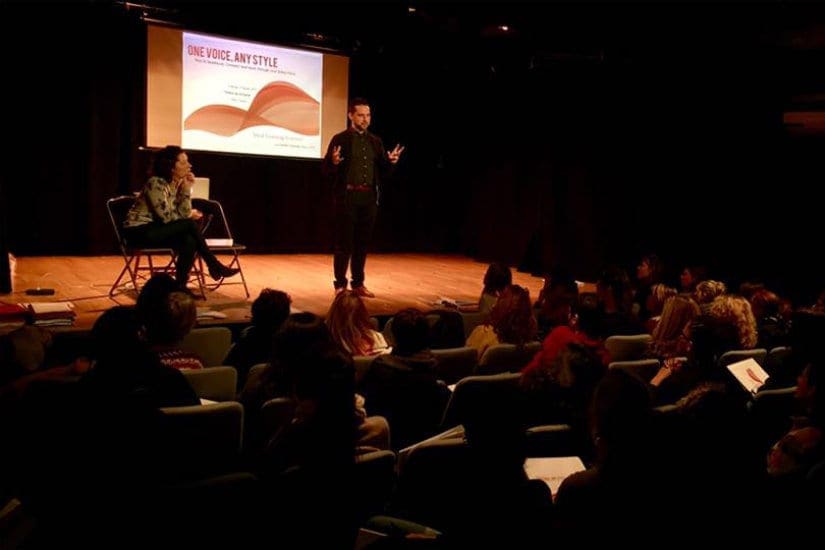
THE SINGING SELF PROGRAM – Teacher Track
will blow your mind by not only asking you to question all of your basic assumptions, but give you a framework for making the paradigm shift from a mechanistic view of voice and learning to a truly holistic and unified vision for the endless improvement of the body/mind/voice/self.

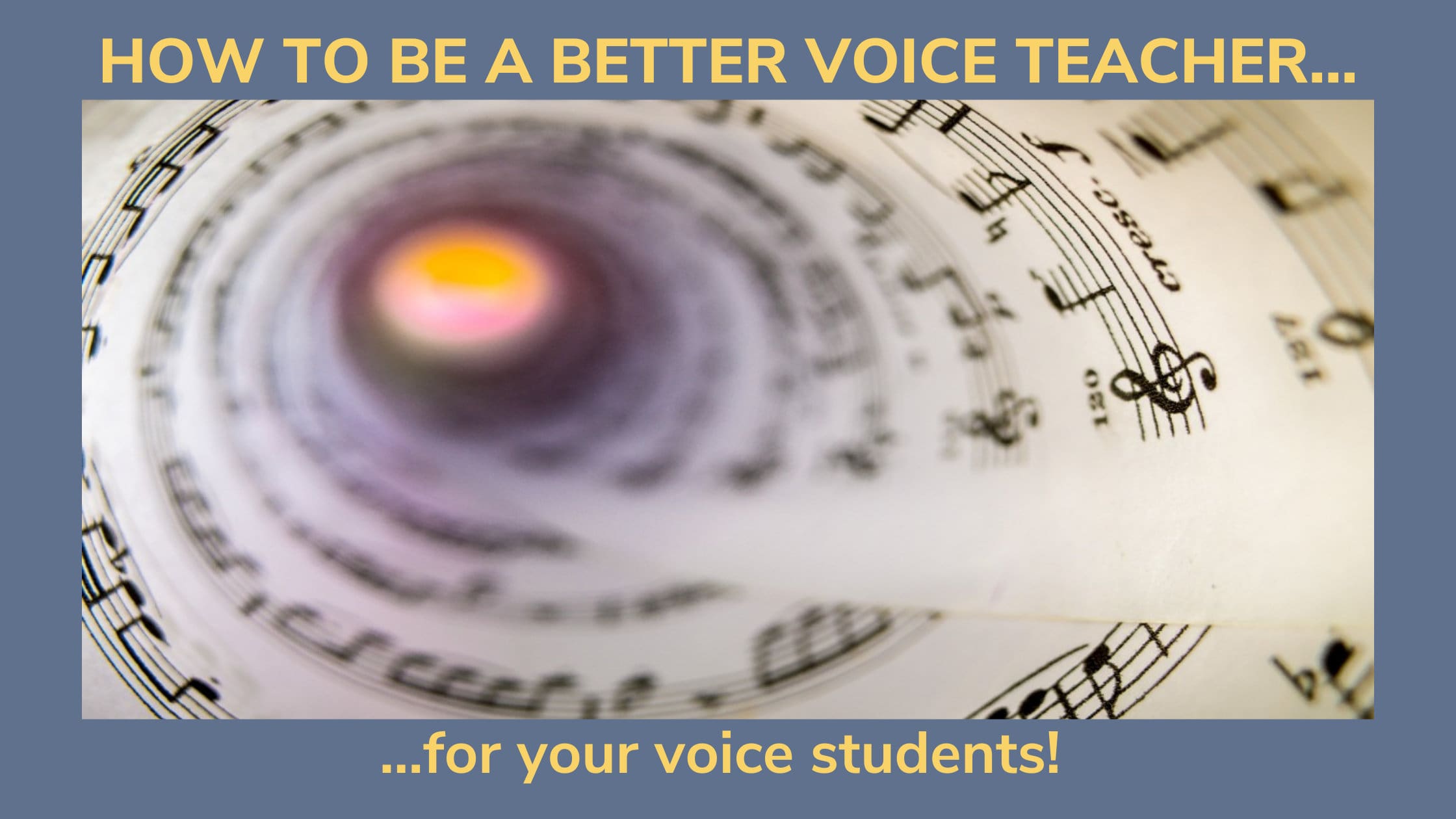

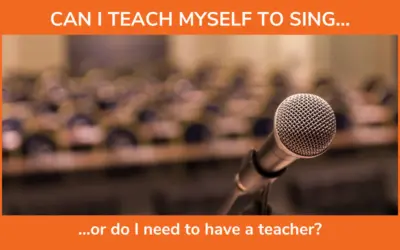
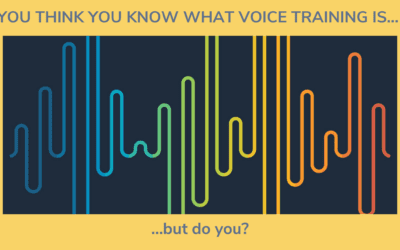
0 Comments